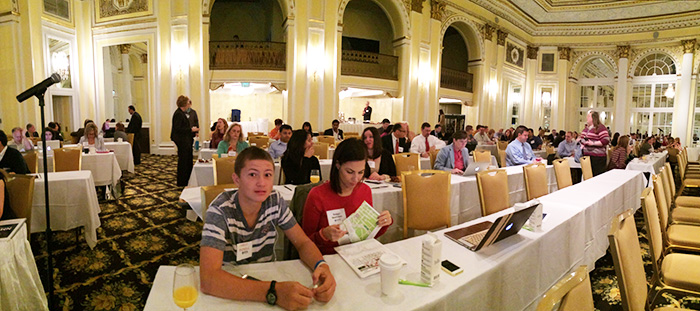My memory is very clear of October 4, 2009, the day Ezra was diagnosed with cancer. Dr Chris Rossbach sat down at St Joseph’s Children’s Hospital in Tampa, and told us Ezra had stage 4 neuroblastoma. I’d never heard the word, and couldn’t spell it. I didn’t even know what stage 4 meant (it’s the worst stage in cancer). I couldn’t imagine a world where my only son had cancer, although I’m pretty sure Robyn had that fear – she lost her dad to cancer when she was 9. Now, we’re friends with dozens of families whose children have or had cancer.
We lost Ezra November 8 of 2010. I remember trying to stuff a bunch of pillows we’d brought from home into the back of our car for the 90 minute drive home. I felt very little – or more likely I felt so much my body simply couldn’t process it; I was in shock. It felt wrong not to be bringing Ezra with us, and I wonder who brought him home to Tampa. What a strange job that must be.
Less than a month after Ezra died, we formed Because of Ezra. Officially 2011 was our first year, but we’d begun work quickly after his death. Although we’d learned a lot in the first 10 months or so of his treatment while we went through frontline therapy (which has a national treatment protocol), the last few months of Ezra’s treatment blew our minds.
When he relapsed, the day before his second birthday, the conversations with physicians changed drastically. Our oncology team asked us what we wanted to do next – without presenting any options than “you should pick a trial.” We didn’t fully understand the significance of the shift – the drs were out of answers, and we had entered a strange new world of clinical trials and treatment options which presented as many questions as they did answers.
For Ezra it didn’t wind up mattering – his cancer spread so quick we ran out of time to get him on a trial before he died. During that time, though, we connected with Dr Giselle Sholler, who chairs the NMTRC, a national consortium of 18 hospitals conducting some incredible research into both frontline and relapsed neuroblastoma treatment. They also do work on other pediatric cancers. We knew our focus with Because of Ezra had to be research – and we have added a secondary focus of advocacy over the years – as lack of research was the reason Ezra had died. There simply was not a cure.
In September of 2011, we attended our first NMTRC Symposium, an annual meeting of parents, physicians, and researchers discussing the work the NMTRC is doing toward a cure for neuroblastoma. These last few days, we were in Grand Rapids for our 4th year at the symposium, this year with Charles. We’ve made amazing friends, and the research results are groundbreaking and exciting.
The international team Dr Sholler has passionately brought together to kick neuroblastoma to the curb is incredible. This year, over 120 people registered, up from ~70 in 2013. Parents of children with neuroblastoma flew in from the UK, Ireland, and all across the US. In all of Europe, there is ONE treatment option (trial) available for relapsed neuroblastoma patients (and it’s been open only a few months). The NMTRC has 7. There are no options for preventing relapse in Europe, which occurs for over half the nb patients who reach remission. Families like Lily-Mae‘s are exerting huge effort and raising hundreds of thousands of dollars in Europe to fly to the US and be treated on these trials.
In 2000, nearly 80% of children with stage 4 neuroblastoma who reached remission relapsed. That number is closer to 40-50% now. Survival rates after relapse were less than 10%. That number is increasing – with data so new it isn’t yet published. Kids on one of the relapse prevention trials using a drug called DFMO are nearly all avoiding relapse, now almost 2 years from the beginning of the trial. Statistically, half or more should have relapsed by now. These are families we share meals with, cry with, and laugh with. These are kids we hug, high five, and listen to jokes from. Kids like Ashley Burnette, now nearly two years cancer-free, whose mom we met this year, and who Hyundai Hope on Wheels has made one of their two 2014-2015 National Youth Ambassadors.
There are other groups researching a cure, too. We find the NMTRC’s work most promising, and since 2011 have funded nearly a quarter million dollars of research through Because of Ezra, thanks to your support. We’ve also funded work from groups like NANT in Los Angeles, and keep ourselves firmly in the national conversation of neuroblastoma research so we know what is going on. As we grow and our voices get louder nationally and in our own Tampa community, and as our partnerships with like-minded organizations and people increase, we know we will be even more effective. We are a constantly growing fist in the face of childhood cancer.
Every year, we love the NMTRC Symposium, as we get a chance to spend a couple days not only with other parents who “get” cancer, but physicians and scientists who genuinely want to hear our stories, get to know us, and build friendships. It is a powerful group of like-minded people using many different skills to reach a common goal – curing neuroblastoma.
Nearly 5 years after we first heard the word neuroblastoma, we are still fighting. We’ve met so many beautiful people who stand beside us now, and have so many who’ve stood with us since the day we found out Ezra had cancer. Thank you. Robyn and I both are hopeful.
